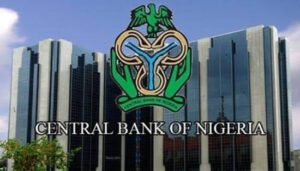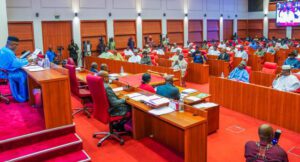


Stock market declines further by N773bn on MPR hike
Transactions on the stock market closed negative on Tuesday for the second day, depreciating further by 1.38 percent in reaction to the outcome of the Monetary Policy Committee (MPC) meeting of the Central Bank of Nigeria (CBN).
Recall that CBN, at the bi-monthly MPC meeting, raised the benchmark lending rate by 400 basis points to 22.75 percent, from 18.75 percent to stem inflation.
The MPC meeting was the first under Mr Olayemi Cardoso, CBN Governor, since he came on board in September 2023.
Consequently, the All-Share Index (ASI), which dropped by 1.38 percent or 1, 412.64 points, closed at 100,582.89 points, compared to 101,995.53 posted on Monday.
The market capitalisation also shed N773 billion or 1.38 percent to close at N55.037 trillion, compared to N55.810 trillion recorded in the previous session.
As a result the Year-To-Date return fell to 34.52 percent.
The market losses were driven by selloffs in MTN Nigeria, FBN Holdings and Guaranty Trust Holding Company (GTCO), among others.
Meanwhile, a total of 280.46 million shares valued at N6.12 billion were exchanged in 9,141 deals, as against 294.32 million shares valued at N6.72 billion, exchanged in 9,957 deals posted previously.
Also, analysis of the market activities showed trade turnover settled lower relative to the previous session, with the value of transactions down by 8.96 per cent.
Reacting, Vice Chairman, Highcap Securities Ltd., David Adonri said that investment in the capital market is vulnerable to changes in the monetary policy.
Adonri, in an interview with journalists in Lagos, explained that the drop in the performance of the market was due to further tightening of the monetary policy by CBN.
He stated that the decision of the CBN MPC means that the interest rate would increase severely.
“If the interest rate rises excessively, the impact on equities is that it will migrate financial assets from equity to debt.
“That was the reaction in the market today,” he said.
On the losers’ table, FBN Holdings and Multiverse Mining and Exploration Plc led in percentage terms of 10 each to close at N30. 60 and N15.30 per share, respectively.
MTN followed with a loss of 9.94 percent to close at N222.90, McNichols Plc shed 9.79 percent to close at N1.29, while Consolidated Hallmark Insurance went down by 9.63 percent to close at N1.22 per share.
On the other hand, Africa Prudential Plc and Omatek Venture led the gainers’ table in percentage terms of 9.86 each to close at N7.80 and 78k per share, respectively.
Juli Plc also gained 9.73 percent to close at N2.82, Tantalizers garnered 8.11 percent to close at 40k, while Ellah Lakes Plc rose by 8.07 percent to close at N3.08 per share.
On the activity table, Transcorp led in volume with 44.41 million shares at the value of N583.52, Access Corporation followed with sales of 30.56 million shares worth N600.55 million.
Also, the United Bank of Africa(UBA) traded 26.51 million shares valued at N611.20 million, Zenith Bank sold 24.96 million shares worth N874.63 million.
The National Salt Company of Nigeria traded 13.80 million shares worth N893.68 million to lead the chart in value.
Meanwhile, market breadth is closed negative with 24 laggards and nine gainers on the equity market.



